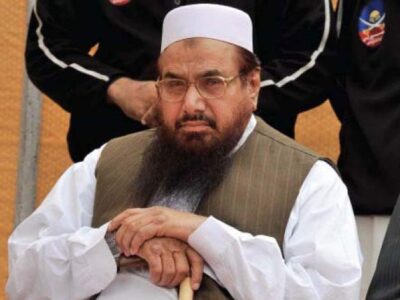
Two more Hafiz Saeed aides jailed in terror financing case
A Pakistani court has jailed two more aides of Mumbai attack mastermind and Jamat-ud-Dawah (JuD) chief Hafiz Saeed in a terror financing case.
The Anti-Terrorism Court (ATC) of Lahore on Friday handed down six and five-and-a-half years of imprisonment to JuD leaders Muhammad Ashraf and Lucman Shah, respectively.
ATC Judge Arshad Hussain Bhutta also imposed a fine of Rs 10,000 on each. On Thursday, the 70-year-old JuD chief was sentenced to 10 years of imprisonment in two terror cases by ATC, Lahore.
Saeed’s two close aides–Zafar Iqbal and Yahya Mujahid–were sentenced to 10 and a half years each while his brother-in-law Abdul Rehman Makki was sentenced to six months of imprisonment in the same cases. Saeed, a UN designated terrorist on whom the US has placed a $10 million bounty, was arrested on July 17 last year in the terror financing cases. He was sentenced to 11 years in jail by an anti-terrorism court in February this year in two terror financing cases.
The JuD chief is lodged at Lahore’s high-security Kot Lakhpat jail. Saeed is wanted in India for planning the 2008 Mumbai attacks when 10 Pakistani terrorists killed 166 persons, including six Americans, and injured hundreds others.
Paris-based global terror financing watchdog Financial Action Task Force (FATF) is instrumental in pushing Pakistan to take measures against terrorists roaming freely in Pakistan and using its territory to carry out attacks in India.
The sentencing of JuD leaders comes weeks after the FATF retained Pakistan on its grey list till February 2021 as Islamabad failed to fulfil the agency’s six key obligations, including failure to take action against two of India’s most wanted terrorists–Saeed and Maulana Masood Azhar.
Saeed-led JuD is the front organisation for the Lashkar-e-Toiba (LeT), which is responsible for carrying out the 2008 Mumbai attack.
The US Department of the Treasury has designated Saeed as a Specially Designated Global Terrorist. He was listed under the UN Security Council Resolution 1267 in December 2008.
Source: Tribune India





